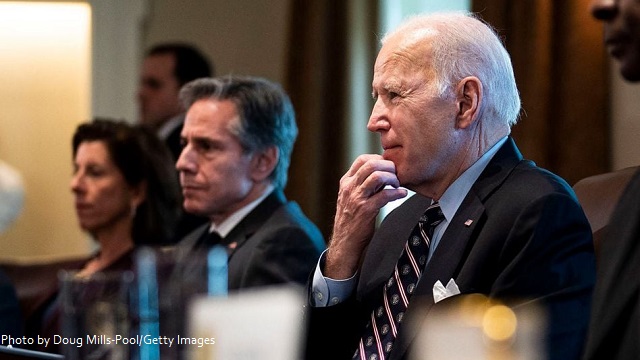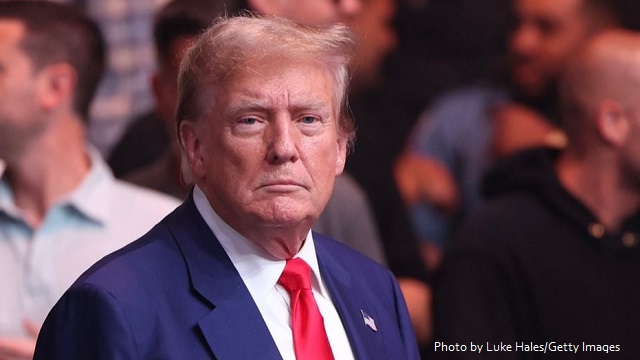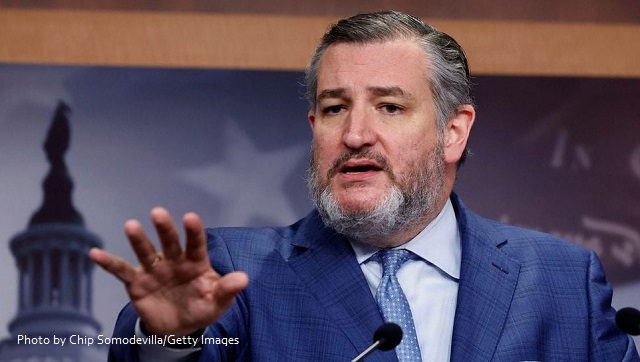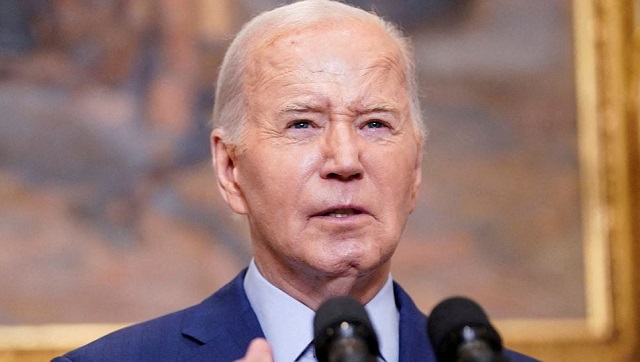
With patriotic Americans preparing to commemorate the brave soldiers who sacrificed themselves in our nation’s battles — and the rest of America preparing to take a day off work — it became easier to miss news stories. But even if you gleaned the headlines like prospectors panning for gold, some stories went underreported in the last full week of May: Big Abortion suffered a setback at the ballot box; Border Patrol suffered (yet another) setback under Joe Biden; Hunter Biden suffered a setback from (allegedly) perjuring himself before Congress; the legacy media suffered a setback with viewers; and all Americans suffered rampant setbacks from inflation.
-
Big Abortion’s Big Defeat
Nonpartisan state elections that take place in the middle of the year receive little media coverage — but the media made an exception this month, when a Georgia Supreme Court race briefly became a national bellwether for abortion. Then, as soon as the results came in, the media shrouded the results in studied silence.
Democrat and former five-term U.S. Congressman John Barrow decided he could win a seat on the Georgia Supreme Court by launching into an extended abortion monologue against Justice Andrew Pinson, who was appointed by Governor Brian Kemp (R) in 2022. Although three other high court justices ran unopposed, Barrow explained he specifically targeted Pinson because, as state solicitor general, Pinson defended Georgia’s heartbeat law — a pro-life protection shielding unborn babies from abortion once doctors can detect a fetal heartbeat, usually around six weeks.
During an interview with The Hill, Barrow summarized his candidacy with a triple-redundant mission statement: “I’m running for the Supreme Court of Georgia because I believe that women today have the same rights under the state constitution that they used to have under Roe vs. Wade, before it was overturned with the help of my opponent, and that’s why I’m running[,] and that’s why I’m running against him.”
No one had any doubt about the thrust of the campaign. Planned Parenthood and abortion lobbying groups endorsed him. “A state Supreme Court race in Georgia puts abortion on the ballot,” proclaimed MSNBC.
Barrow remained so committed to centering his entire campaign on abortion that, when the Georgia Judicial Qualifications Commission told him he was violating judicial ethics by announcing how he would vote on cases that had yet to come before him, Barrow sued to keep talking about abortion. (A judge dismissed the case.)
How did Barrow’s single-issue campaign come out? He lost by a 10-point spread: 55% Pinson vs. 45% Barrow.
The Southeast campaign director of the abortion lobby group Reproductive Freedom for All (formerly NARAL Pro-Choice America), Alicia Stallworth, pronounced the group “deeply disappointed” at the results. Christian conservatives celebrated. “The Democratic strategy of placing abortion at the center of the 2024 campaign utterly failed” last Tuesday in Georgia, said Ralph Reed, Faith & Freedom Coalition chairman and founder. Barrow’s loss “calls into question the entire Democratic strategy of eking out a victory by scaring suburban voters with abortion.”
The word sadly trickled out in local media. “Incumbent Georgia Justice Andrew Pinson defeats challenge from John Barrow focused on abortion rights,” stated Atlanta’s public broadcasting station WABE. “Justice Pinson wins court race that became referendum on abortion rights in Georgia,” reported Georgia Reporter, a publication of States Newsroom (a left-wing organization posing as a news organization, as we described earlier this month).
Curiously, that’s when the previously top-watched race fell off the national radar. The story made the national media thanks to Tim Carney of the Washington Examiner, who called Barrow’s defeat “perhaps the biggest electoral win for the pro-life cause since the fall of Roe v. Wade.”
It bears repeating: The narrative of the undefeatable abortion monologue had failed. Pro-life candidates should campaign accordingly.
-
U.S. Border Patrol Has Lost One-Quarter of Its Agents during the Biden Administration
It’s no secret that illegal immigration — a simmering, slow-motion crisis that has been percolating for decades — has reached its worst extent thanks to the malign neglect of the Biden administration. Fewer stories have featured the morale-sapping impact his policies have on those who signed up to keep America’s borders secure.
One out of every four Border Patrol agents has left the agency since Joe Biden took office, a new review of the statistics has found. That’s an attrition rate far higher than his predecessors.
The Border Patrol employed 19,357 agents in fiscal year 2022.
During the Trump and Obama administrations, the agency lost an average of 996 agents a year — or 3,486 agents during a comparable 42-month period.
But since October 2020, the Border Patrol has lost a grand total of 4,281 agents: 3,665 in fiscal years 2020-2023, and 616 in the six months after the end of FY 2023 last October. That averages out to 1,222 agents annually in the Biden years.
Much of that atrophying came from experienced agents deciding they have had enough of Biden’s policies. Early retirements more than doubled during this period, from 257 a year (2014-2020) to 529 during this administration.
Biden lied that two Border Patrol agents in Del Rio, Texas, “whipped” illegal immigrants from Haiti who attempted to run past the agents into U.S. territory. “Those people will pay,” Biden vowed, before an investigation had formally taken place. As I explained at the time, “In reality, Border Patrol agents don’t carry whips, none of the photos showed their reins touching anybody, and agents would swing their reins to prevent people from getting hurt by their trampling horses.” The story proved as comprehensively false as any story can. The administration quietly dropped the case — but used the false story to prevent agents from patrolling the border on horseback. Competent agents decided they did not want to become the next one singled out for national humiliation by the president of the United States on the grounds of a baseless allegation.
Clearing out a federal agency of competent, dedicated civil servants accomplishes a dark, double policy goal for Biden: It removes agents who might pose administrative obstacles to his lax border policies and makes room to replace them with “diverse” new hires committed to his open borders agenda.
-
Hunter Biden Committed Perjury?
It’s hardly news that the legacy media suppresses stories about Hunter Biden. Not only did major news outlets refuse to cover his laptop (after receiving a briefing from the intelligence community that such a story would be leaked by a foreign power), but they publicized a statement organized by Democratic officials from former intelligence agents insisting the whole thing smacked of perfidious Russian disinformation.
Well, they’re at it again.
The House Ways and Means Committee announced last Tuesday the release of more than 100 pages of obtained evidence from IRS whistleblowers that Hunter Biden may have committed perjury before Congress on February 28. Hunter Biden famously flouted his defiance of a congressional subpoena by storming out of a hearing and demanding a public interrogation, before retreating to the safety of a closed-door deposition.
The evidence shows that he lied under oath three times, House Republicans say. They say Hunter lied about a text he sent telling a Chinese official he and his father would use all their power against the company unless they received payment for services rendered. “I sent the text to the wrong Zhao,” said Hunter, claiming he texted a man who had nothing to do with the Chinese energy company and probably had no idea what the texts were about. The committee released WhatsApp records showing Biden contacted only one Zhao, named Raymond Zhao, whom he stayed in touch with for months. Zhao facilitated the release of $5 million from China to the Biden family.
They also say Hunter Biden fibbed when he claimed a shell company he set up with friend Devon Archer, Rosemont Seneca Bohai, was never “under my control nor affiliated with me.” The committee released a document signed by the president’s son stating, “I, Robert Hunter Biden, hereby certify that I am the duly elected, qualified and acting Secretary of Rosemont Seneca Bohai, LLC.”
Biden also denied trying to help any foreign business associates obtain a U.S. visa. “I’d never pick up the phone and call anybody for a visa,” he said under oath. The committee released an email from Devon Archer stating, “Hunter is checking with Miguel Aleman to see if he can provide cover to Kola on the visa.” The individual in question, “Kola,” is Nikolay Zlochevsky, CEO of Burisma.
“Lying during sworn testimony is a felony offense that the Department of Justice has prosecuted numerous individuals for in recent years, and the American people expect the same accountability for the son of the president of the United States,” said Rep. Jason Smith (R-Mo.), chairman of the powerful committee.
Curiously, this blockbuster revelation has made few headlines, as the media instead repeat the most salacious details of Donald Trump’s trials which, arguably, are not criminal. This jaundiced coverage may explain why …
-
Americans Keep Fleeing the Legacy Media
After years of repeating the “Russia collusion” narrative and covering up “fiery but mostly peaceful” protests, the legacy media continue to lose readers and trust. Two former titans of the legacy media announced last week they have taken on water.
The most influential newspaper in the nation’s capital, The Washington Post, has officially lost half of its subscribers since 2020. The subscriber plunge cost the newspaper $77 million in revenue in just the last year. “To speak candidly: We are in a hole, and we have been for some time,” Post publisher Will Lewis told employees during a meeting last Wednesday.
But the Post has plans to turn around the slide by rolling out tiered membership plans, as well as (in the words of the Post), “launching a product focused on the relationship between the climate and the economy.” It’s not clear how that will help, since voters ranked “dealing with climate change” 18th out of 20 issues presented to them as the most important crises facing America in a Pew Research Center survey earlier this year. (“Strengthening the economy” came in number one.) “I hope in the future you see this day as a significant day in the history of our company,” Lewis told employees.
Good luck with that.
Readers are not just giving up on newspapers: They’re also turning off left-wing news outlets. During the week of May 13-19, CNN averaged the lowest viewership among its most coveted audience in 33 years. CNN averaged only 83,000 members of the “targeted demographic,” which consists of people between the ages of 25 and 54. That’s its lowest share since 1991. CNN won a total viewership of 494,000 — less than half of rival MSNBC and less than one-quarter of Fox News Channel’s two million total viewers. That comes after CNN lost $100 million in revenue in 2022.
The driving force of much legacy media also took a step backwards. The left-wing group Media Matters for America (MMFA) — founded by Hillary Clinton ally David Brock and funded by George Soros — created miniature media feeding frenzies by wrenching soundbites of conservative commentators out of context. The legacy media often did no original research before breathlessly repeating their press releases.
The turning point came last November, when Elon Musk took MMFA to court for defamation after the group claimed major advertisers’ slogans appeared next to Nazi and white supremacist symbols and slogans on the social media platform X. But it appears MMFA “researchers” simply created accounts that followed only the most offensive accounts and major corporations, until its feed artificed results that would never occur organically.
Facing the music, Media Matters announced mass layoffs last Thursday. “We’re confronting a legal assault on multiple fronts and given how rapidly the media landscape is shifting, we need to be extremely intentional about how we allocate resources in order to stay effective,” said MMFA President Angelo Carusone.
Apparently, there is a price to pay for churning out bad journalism.
-
Inflation Is Canceling Many Summer Vacations
Memorial Day weekend marks the unofficial beginning of summer, but too many Americans cannot afford a family holiday this year thanks to Bidenomics.
A new survey released by Fox News last week found that 55% of Americans will not be taking a summer vacation this year — and 73% of those respondents say high prices and the poor economy make it impossible. A total of 72% of travelers say prices affected their decisions about taking a vacation. One told the Associated Press that the crime-riddled city of Philadelphia “was not our original destination, but we chose here because it was cheaper.”
At the same time, families are having a harder time having a staycation in their own homes, because home ownership has crept increasingly out of reach due to rampant Bidenflation. The figures tell the full story: The average person needs to earn 80% more today than in 2020 to buy a home — $47,000 more than in 2020 — yet average wages increased during that time only 23% in nominal terms. “In 2020, a household earning $59,000 annually could comfortably afford the monthly mortgage on a typical U.S. home,” explained Zillow. “Now, the roughly $106,500 needed to comfortably afford the mortgage payment on a typical home is well above what a typical U.S. household earns each year, estimated at about $81,000.”
Inflation does not just impact vacation plans: 86% of small businesses say “inflation has hurt their businesses in the past year,” according to a survey produced by Alignable. More than three out of four small business owners also cited “tax policies” (79%) and “regulations” (76%) as “major hurdles” to their success. “In particular, many said taxes are just too high,” reported Alignable, “especially since interest rates and inflation have reduced their cash on hand.”
The fact is, you aren’t being told about inflation, but you don’t need to be. You’re living it.
AUTHOR
Ben Johnson is senior reporter and editor at The Washington Stand.
EDITORS NOTE: This Washington Stand column is republished with permission. All rights reserved. ©2024 Family Research Council.
The Washington Stand is Family Research Council’s outlet for news and commentary from a biblical worldview. The Washington Stand is based in Washington, D.C. and is published by FRC, whose mission is to advance faith, family, and freedom in public policy and the culture from a biblical worldview. We invite you to stand with us by partnering with FRC.





















